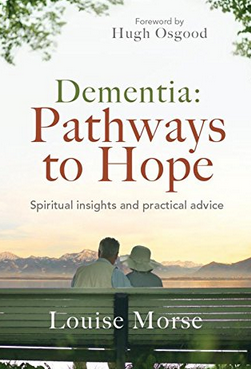Dementia: Pathways to Hope
Well-researched book which cannot fail to be helpful with those encountering dementia in its early stages
 Dementia: Pathways to Hope
Dementia: Pathways to Hope
By Louise Morse
Published by Lion Hudson Plc
ISBN 978-0-85721-655- 7
Reviewed by Martin Poole
Louise Morse has written a well researched book which cannot fail to be helpful with those encountering dementia in its early stages, as well as being supremely beneficial to all carers, whether they be professionals, family members or churches where dementia sufferers are an increasing element.
Louise writes as a committed Christian, with a wealth of experience in her work with the Pilgrim’s Friend Society, which runs nursing and care homes up and down the country. She manages to combine Cognitive Behavioural Therapy, the main plank of treatment so beneficial to sufferers, with scripture, seeing the former as “basically applied scriptural common sense.”
The chapter headed “Strength for the Journey” highlights the issues of growing old, citing Billy Graham’s profound admission “All my life I was taught how to die as a Christian, but no one ever taught me how I ought to live in the years before I die .. It is not easy.”
The book is full of highly illuminating anecdotes from both sufferers and carers, and is undergirded by well chosen biblical texts and the knowledge that in dementia the person’s essence has not changed. The Christian hope of eternity is well to the fore and the understanding that it is “God who hangs on to us” is a constant theme.
Very helpfully Louise devotes a chapter on how churches can provide real support for those affected by dementia and their often stressed care givers. She nails the objection to “Why visit when there is no sense of recognition or remembrance of the visit?” The visit, she helpfully reminds us, is not about the visitor, but the visitee and the benefit to the latter should not be underestimated:
If I enjoy your visit, why must I remember it?
Why must I remember who you are?
Is this just to satisfy your own need for identity?
If I forget a pleasant memory it does not mean that it was not important for me
This is a book that could help so many with confronting this increasingly prevalent, destructive disease, which has been described by some as a modern plague. It can, as the title suggests, displace despair with hope.
The Revd Martin Poole (retired Baptist minister having served churches in Penarth, Godalming and Eastleigh)
Baptist Times, 20/01/2017